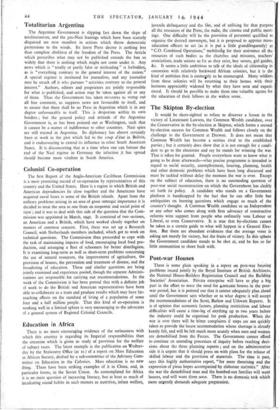Education in Africa There is no more encouraging evidence of
the seriousness with which this country is regarding its Imperial responsibilities than the attention which is given to study of provision for the welfare of subject races. The latest example is the publication on Wednes- day by the Stationery Office (at is.) of a report on Mass Education in African Society, drafted by a sub-committee of the Advisory Com- mittee on Education in the Colonies. Mass education is no new thing. There have been striking examples of it in China, and, in particular forms, in the Soviet Union. As contemplated for Africa it is no mere question of increasing literacy, but at least as much of inculcating sound habits in such matters as nutrition, infant welfare, juvenile delinquency and the like, and of utilising for that purpose all the resources of the Press, the radio, the cinema and public meet- ings. One difficulty will be the provision of personnel qualified to organise the desired movement, but it is proposed to appoint mass- education officers to act (as it is put a little grandiloquently) as "C.O. Combined Operations," mobilising for their assistance all the resources of such bodies as the churches and missions, teachers' associations, trade unions so far as they exist, boy scouts, girl guides, Sz.c. It seems a little ambitious to talk of the ideals of citizenship in connexion with relatively backward African colonies, but it is the kind of ambition that is emineptly to be encouraged. Many soldiers from these colonies will be returning to their homes with their horizons appreciably widened by what they have seen and experi- enced. It should be possible to make them into valuable agents for the education of their fellows in the widest sense.


























 Previous page
Previous page